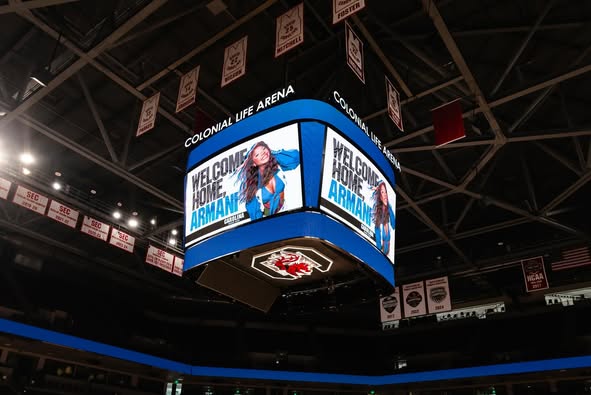Armani Latimer’s return to the Carolina campus is not just a homecoming—it is a powerful statement about legacy, leadership, and the enduring influence of a role model who has mastered the art of inspiring others beyond the bounds of performance. As a Carolina Dance alum and five-year veteran of the iconic Dallas Cowboys Cheerleaders, Latimer’s career has been a remarkable journey marked by poise, professionalism, and purpose. Now, she is back where it all began, ready to guide and mentor the next generation of Gamecocks, bringing with her not just technical expertise but a life story that is as impactful as any championship performance. Her presence carries the weight of experience, the passion of a performer, and the conviction of an advocate who understands the power of her platform. For current Carolina dancers and students, Latimer’s return offers a rare opportunity to learn from someone who has thrived in one of the most competitive performance environments in the world while also using her voice to champion issues that matter. Her career with the Dallas Cowboys Cheerleaders placed her in front of millions, but her work off the field—particularly in advocating for pay equity and raising awareness for alopecia areata—has proven that her influence reaches far beyond the bright lights of game day. This blend of artistry and activism is exactly why her mentorship will resonate so deeply with young performers seeking to find both their voice and their place in the world.
Latimer’s roots in Carolina dance culture run deep. As a student, she was known not only for her technical excellence but also for her leadership qualities—an ability to connect with her teammates, lift others’ spirits, and create a sense of unity within the group. Those early experiences shaped her understanding of what it means to be part of a team and laid the foundation for the demanding career that followed. Transitioning from collegiate dance to the high-pressure world of NFL cheerleading is no small feat. The Dallas Cowboys Cheerleaders are renowned for their rigorous auditions, elite performance standards, and global visibility. Latimer embraced the challenge, spending five seasons representing one of the most recognized sports organizations in the world. During that time, she learned to navigate the intense schedule, the physical demands, and the expectations of a role that requires equal parts athleticism, showmanship, and public relations skill.
Yet while the glamour of NFL cheerleading is often highlighted, Latimer has been candid about the realities behind the scenes, especially regarding compensation and professional recognition for performers. Her advocacy for pay equity is rooted in firsthand experience, and she has used her voice to call for fairer treatment and opportunities for women in professional sports entertainment. For young women looking up to her, this message is both empowering and instructive: success is not just about excelling within the system but also about challenging that system when it falls short of valuing your worth. It is a lesson that applies to any field, and one that will undoubtedly leave a lasting impression on those she mentors.
Equally inspiring is Latimer’s openness in sharing her journey with alopecia areata, an autoimmune condition that causes hair loss. In a profession where appearance is often scrutinized under unforgiving lights and cameras, her decision to speak publicly about her experience is an act of both courage and advocacy. By aligning herself with the alopecia community and participating in awareness campaigns, she has helped dismantle stereotypes and offered hope to others navigating similar challenges. Her willingness to be vulnerable in such a public arena reinforces the idea that beauty, confidence, and talent are not defined by superficial standards, but by authenticity, resilience, and self-belief.
Her return to Carolina could not be more timely. Today’s students and young athletes face a world where visibility and social influence are often measured in likes and follows, yet the pressures to conform to unrealistic expectations remain as intense as ever. Latimer brings a grounded, real-world perspective that can help students navigate these pressures while staying true to themselves. She understands that mentorship is not just about teaching technique or critiquing performances—it’s about cultivating confidence, building resilience, and encouraging authenticity. She can speak to the unique challenges of balancing artistry with advocacy, as well as the rewards of using your platform to make a difference.
During her time on campus, Latimer is expected to engage with dancers through workshops, personal mentoring sessions, and open discussions about her career and advocacy work. For many, this will be an invaluable chance to receive direct feedback from someone who has performed on some of the biggest stages in sports and entertainment. But beyond the dance floor, her presence will inspire conversations about self-worth, representation, and the power of using one’s talents for a greater purpose. Students will see firsthand that success in the performance industry is not linear—it is a journey that requires adaptability, self-advocacy, and the courage to redefine success on your own terms.
Her mentorship will also bridge the gap between past and present generations of Carolina performers. Alumni who remember Latimer’s time as a student will take pride in seeing her return to give back, while current students will gain a sense of belonging to a larger, supportive community of performers who have gone on to achieve remarkable things. This sense of continuity and shared identity strengthens the culture of the Carolina program, reinforcing the idea that each generation has a responsibility to lift up the next.
Perhaps most importantly, Latimer’s story demonstrates that a career in performance can be a launchpad for a broader mission. Too often, performers are celebrated only for their time in the spotlight, with little attention given to the ways they continue to impact their communities once the performance ends. Latimer’s career arc—from Carolina to the Dallas Cowboys Cheerleaders to her current work as an advocate and mentor—challenges that narrow view. It shows that the skills developed in performance—discipline, communication, adaptability—are transferable to any arena where leadership and passion are needed. It also sends a powerful message to students: your career is not confined to a single role or title; you have the power to evolve and expand your impact in ways you might not yet imagine.
As she steps back onto the Carolina campus, Armani Latimer embodies the full spectrum of what it means to be a leader in today’s world. She has danced under stadium lights before massive crowds, spoken out for fairness in the workplace, and shared her personal journey to encourage others. Each chapter of her career has added depth to her character and purpose to her platform. Now, she is channeling all of that experience into guiding young performers who will one day write their own stories of success, advocacy, and inspiration. Her return is more than a visit—it is a call to action for students to dream big, stand firm in their values, and use their voices for good.
In the end, Armani Latimer’s journey proves that the most meaningful legacies are not built solely in moments of glory, but in the impact you leave on others when the spotlight dims. By returning to Carolina to mentor the next generation, she is ensuring that her influence will echo long after the final performance. For the Gamecocks who will learn from her, this is not just a lesson in dance—it is a masterclass in leadership, resilience, and the art of inspiring change.



